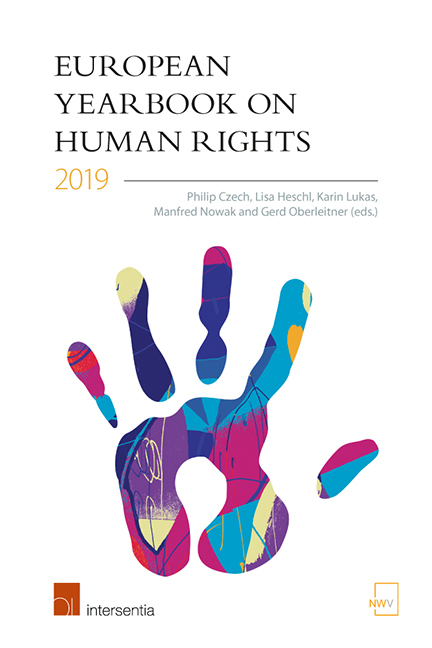Book contents
- Frontmatter
- Miscellaneous Frontmatter
- Editors’ Preface
- Contents
- List of Abbreviations
- List of Contributors
- PART I TOPIC OF THE YEAR
- PART II EU
- PART III CoE
- PART IV OSCE
- PART V REPORTS FROM THE FIELD
- PART VI OTHERS
- PART VII BOOK REVIEWS
- Lisa Heschl: Protecting the Rights of Refugees Beyond European Borders – Establishing Extraterritorial Legal Responsibilities
- Lorenza Violini and Antonia Baraggia (eds.): The Fragmented Landscape of Fundamental Rights Protection in Europe
- Panos Kapotas and Vassilis P. Tzevelekos (eds.): Building Consensus on European Consensus – Judicial Interpretation of Human Rights in Europe and Beyond
- Pieter van Dijk, Fried van Hoof, Arjen van Rijn and Leo Zwaak (eds.): Theory and Practice of the European Convention on Human Rights
- Adrienne Yong: The Rise and Decline of Fundamental Rights in EU Citizenship
- Jeroen Temperman, T. Jeremy Gunn and Malcolm Evans (eds.): The European Court of Human Rights and the Freedom of Religion or Belief – The 25 years since Kokkinakis
- Janneke Gerards: General Principles of the European Convention on Human Rights
- Index
Adrienne Yong: The Rise and Decline of Fundamental Rights in EU Citizenship
from PART VII - BOOK REVIEWS
Published online by Cambridge University Press: 24 January 2020
- Frontmatter
- Miscellaneous Frontmatter
- Editors’ Preface
- Contents
- List of Abbreviations
- List of Contributors
- PART I TOPIC OF THE YEAR
- PART II EU
- PART III CoE
- PART IV OSCE
- PART V REPORTS FROM THE FIELD
- PART VI OTHERS
- PART VII BOOK REVIEWS
- Lisa Heschl: Protecting the Rights of Refugees Beyond European Borders – Establishing Extraterritorial Legal Responsibilities
- Lorenza Violini and Antonia Baraggia (eds.): The Fragmented Landscape of Fundamental Rights Protection in Europe
- Panos Kapotas and Vassilis P. Tzevelekos (eds.): Building Consensus on European Consensus – Judicial Interpretation of Human Rights in Europe and Beyond
- Pieter van Dijk, Fried van Hoof, Arjen van Rijn and Leo Zwaak (eds.): Theory and Practice of the European Convention on Human Rights
- Adrienne Yong: The Rise and Decline of Fundamental Rights in EU Citizenship
- Jeroen Temperman, T. Jeremy Gunn and Malcolm Evans (eds.): The European Court of Human Rights and the Freedom of Religion or Belief – The 25 years since Kokkinakis
- Janneke Gerards: General Principles of the European Convention on Human Rights
- Index
Summary
Fundamental rights and European Union (EU) citizenship: the title of this book looks like an oxymoron, reflected by the combination of the universality of fundamental rights and the essentially exclusive nature of citizens’ rights. However, within EU law, since their first inception, both the concepts of EU fundamental rights and EU citizenship status have been (intentionally) extremely restricted in scope. While the former is strictly linked to the application of EU law (Articles 51–54 of the Charter of Fundamental Rights), the latter was made dependent on the nationality of a Member State, de facto hampering the development of the transnational concept of EU citizenship itself. However, EU fundamental rights and EU citizenship are much closer concepts than they perhaps appear and could empower each other and positively impact EU citizens’ rights.
In her work, Adrienne Yong maintains the existence of an empowering and fulfilling relationship between fundamental rights and EU citizenship. Indeed, these two concepts share the same objective, namely the strengthening of protection of individuals’ rights within the EU. To analyse how the integration of EU fundamental rights and citizenship status has evolved, Yong reviews the Court of Justice of the European Union's (CJEU) case law on citizenship.
The author collocates her analysis into an historical frame and, following the path drawn by Professor Niamh Nic Shuibhne, also identifies three ‘ages’ of citizenship: the first emerges with the development of a fundamental rights case law, develops through the formal introduction of the EU citizenship in the Maastricht Treaty and ends with the landmark Sala case in 1998; the second captures a decade of citizenship case law, between the aftermath of the Sala case and 2009; the third age reflects the Court's case law after the entry into force of the Lisbon Treaty which elevated the Charter to equal status with the Treaties.
The author offers an insightful analysis of the CJEU's normative reasoning, which is substantially distinct in each of the aforementioned phases. In particular, Yong extensively demonstrates how the Court, throughout the first and the second age of citizenship, has broadened the scope of ratione personae and ratione materiae of EU citizenship, by departing from purely market-based considerations towards a more liberal interpretation of EU citizenship rights.
- Type
- Chapter
- Information
- European Yearbook on Human Rights 2019 , pp. 577 - 578Publisher: IntersentiaPrint publication year: 2019



